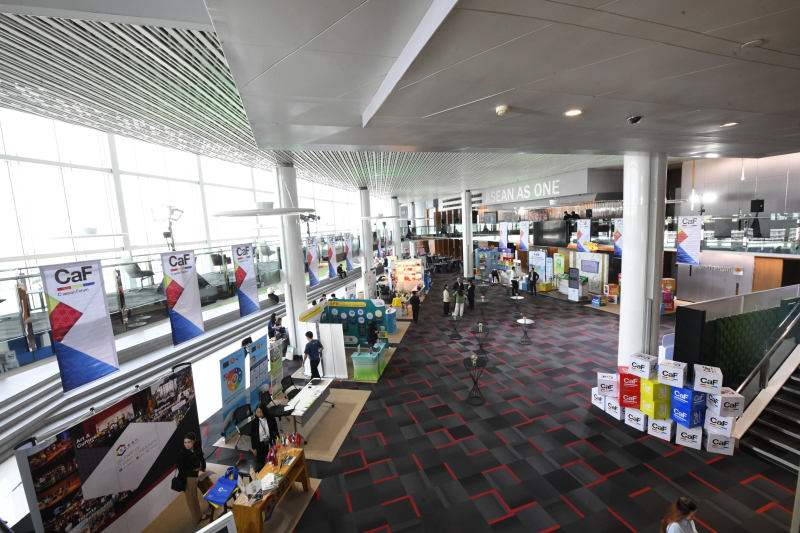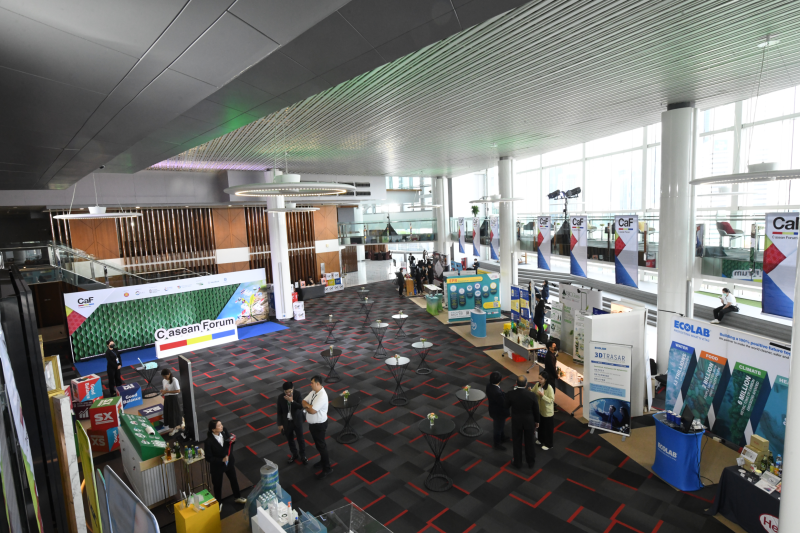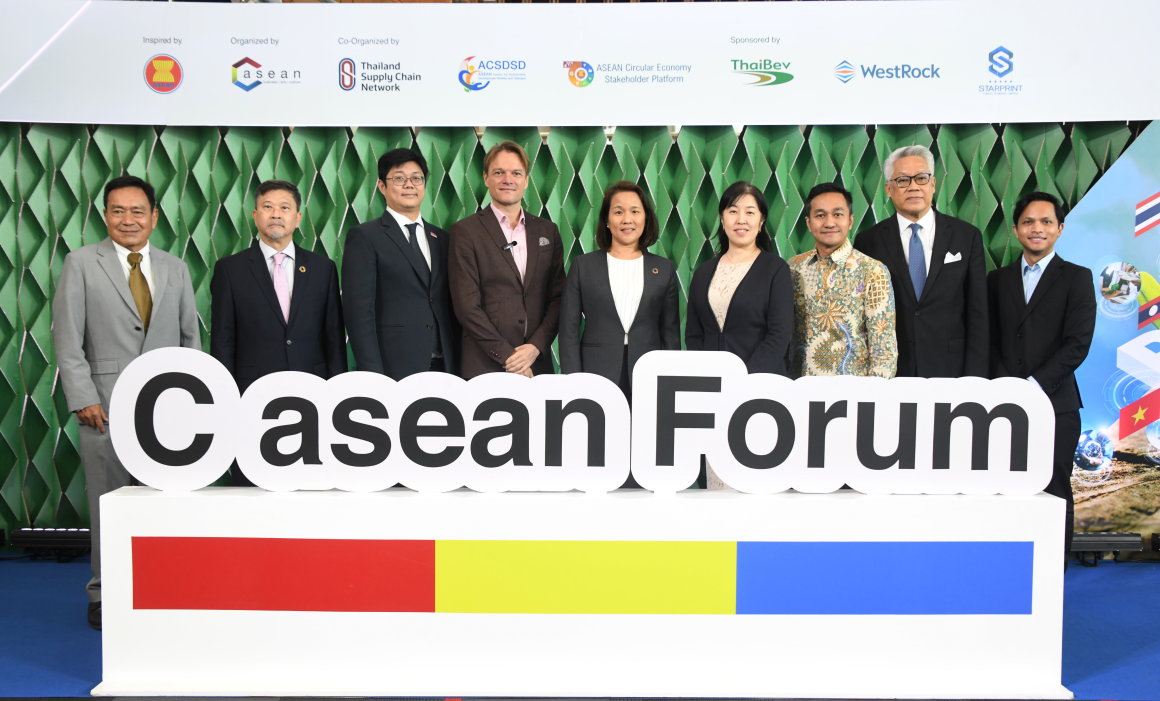On 28th March 2024, at the C asean Auditorium CW Tower, Bangkok, Thailand, over 333 Circular Economy and Extended Producer Responsibility (EPR) stakeholders, including policymakers, industry representatives, academia and environmental advocates, participated in the “C asean Forum 2024: ASEAN Action Towards Circular Economy: Move Forward with Extended Producer Responsibility.”
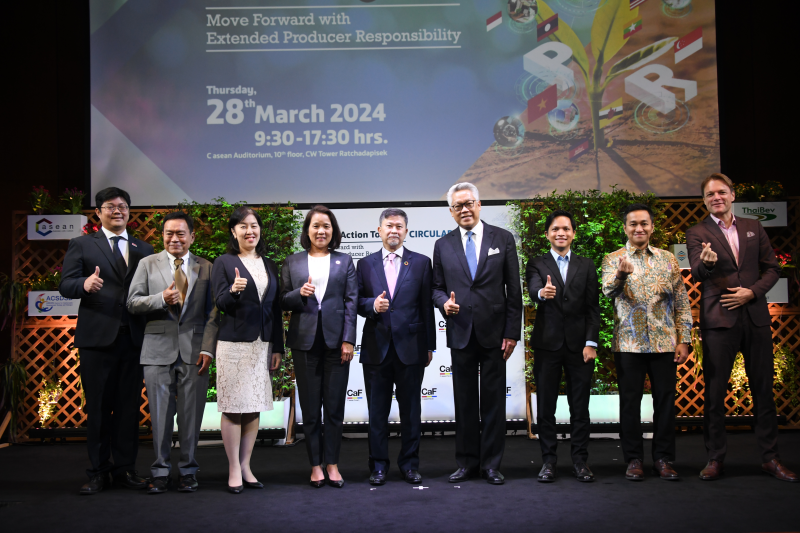
This event is a collaborative effort organised by the ASEAN Centre for Sustainable Development Studies and Dialogue (ACSDSD), the C-asean and Thailand Supply Chain Network. Its primary objective is to foster a collaborative and informed dialogue, inspiring actionable strategies for adopting EPR across the ASEAN region. By bringing diverse perspectives and experiences together, the event seeks to develop a roadmap for incorporating EPR principles into national policies, industry practices, and community initiatives. The ultimate vision is to propel ASEAN towards a Circular Economy that safeguards the environment and catalyses economic growth and social well-being. This forum stands as a testament to ASEAN’s commitment to sustainable development and responsible resource management, setting the stage for a future where circularity is not just an aspiration but a shared reality.
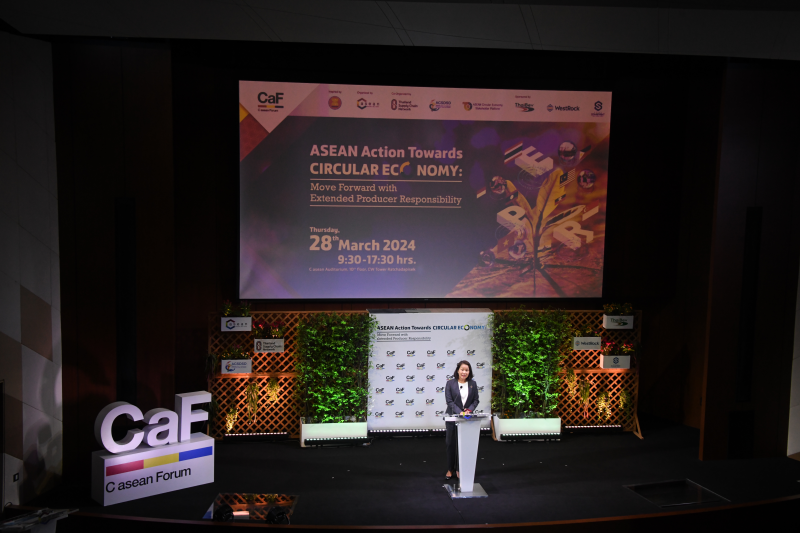 The C asean Forum 2024 commenced with Khun Tongjai Thanachanan, Managing Director of C asean, delivering insightful Welcoming Remarks. Her emphasis on advancing towards a Circular Economy in ASEAN set the tone for discussions ahead, highlighting the significance of collective efforts in shaping the regional landscape.
The C asean Forum 2024 commenced with Khun Tongjai Thanachanan, Managing Director of C asean, delivering insightful Welcoming Remarks. Her emphasis on advancing towards a Circular Economy in ASEAN set the tone for discussions ahead, highlighting the significance of collective efforts in shaping the regional landscape.
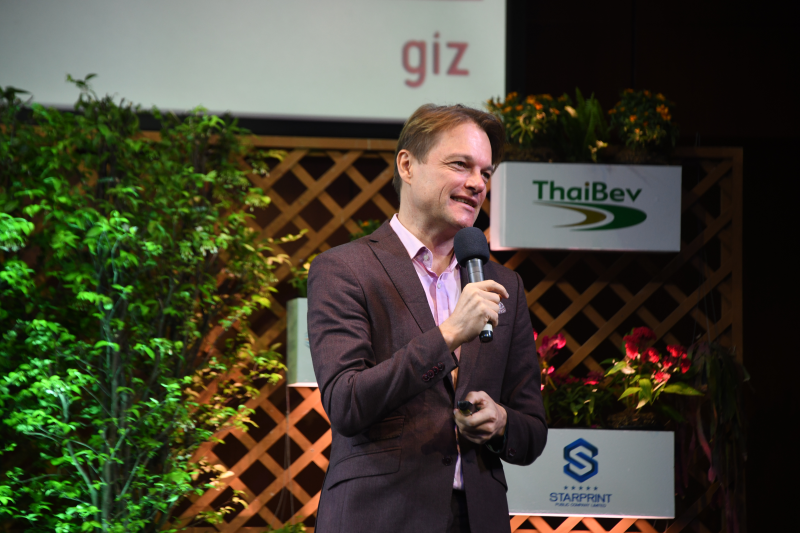
Following Khun Tongjai Thanachanan ‘s remarks, Mr. Kai Hofmann, Program Head at GIZ, enlightened attendees on “Circular Economy for the ASEAN Region.” His presentation provided valuable insights into the opportunities and challenges of embracing circularity, setting the stage for deeper discussions.
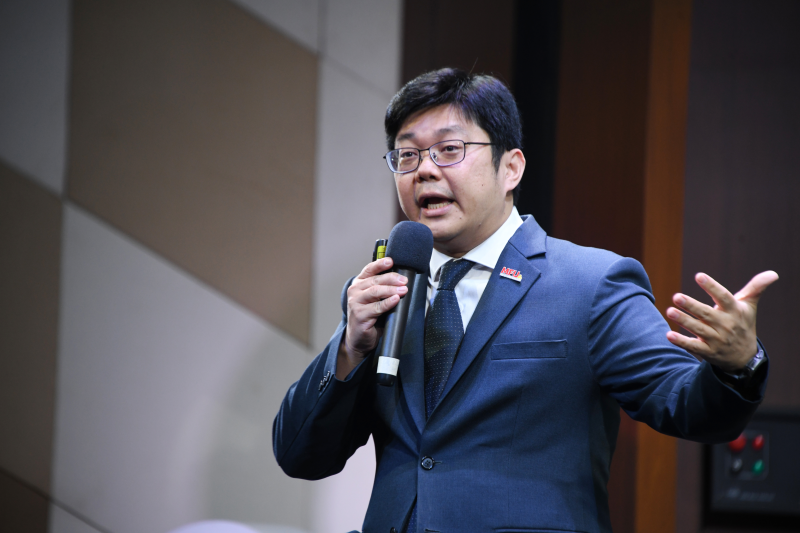
Dr Panate Manomaivibool, Partner of the EU SWITCH-Asia Programme and Mae Fah Luang University professor continued the journey and shared valuable insights on “EPR Learning from EU Experiences.” His expertise enriched the dialogue, fostering collaboration towards Extended Producer Responsibility (EPR) in the region.
The event transitioned into an engaging Panel Discussion on “Promoting EPR Across ASEAN” moderated by Dr. Anthony Pramualratana, Deputy Executive Director of ACSDSD. Esteemed panellists, including Dr Panate Manomaivibool, Mr Carlo Delantar, and Mr Rocky Pairunan, explored strategies and best practices for promoting EPR across ASEAN, fostering a collaborative dialogue to drive meaningful change.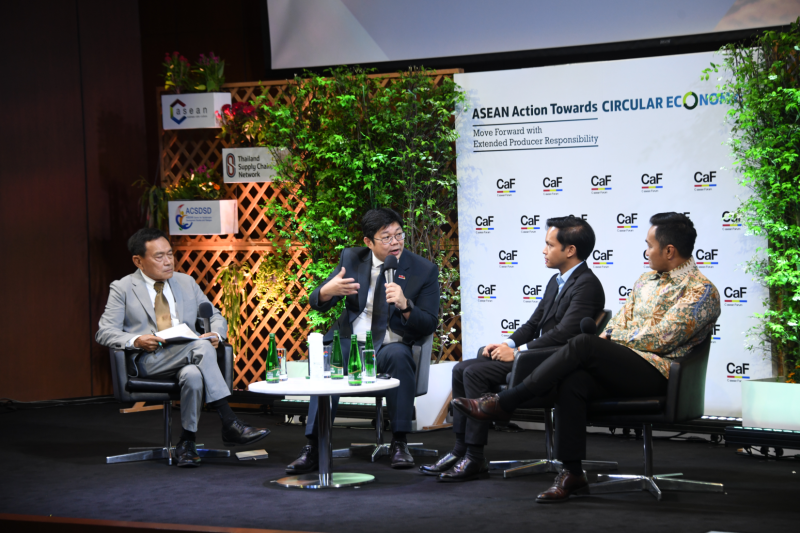
A panel discussion session titled “Promoting Extended Producer Responsibility (EPR) Across ASEAN” delves into the intricacies of implementing Extended Producer Responsibility (EPR) within the ASEAN region. Drawing from a wealth of expertise and regional experiences, the session aimed to facilitate collaboration and knowledge exchange to address the challenges and opportunities associated with waste management and circular economy principles. During the panel discussion
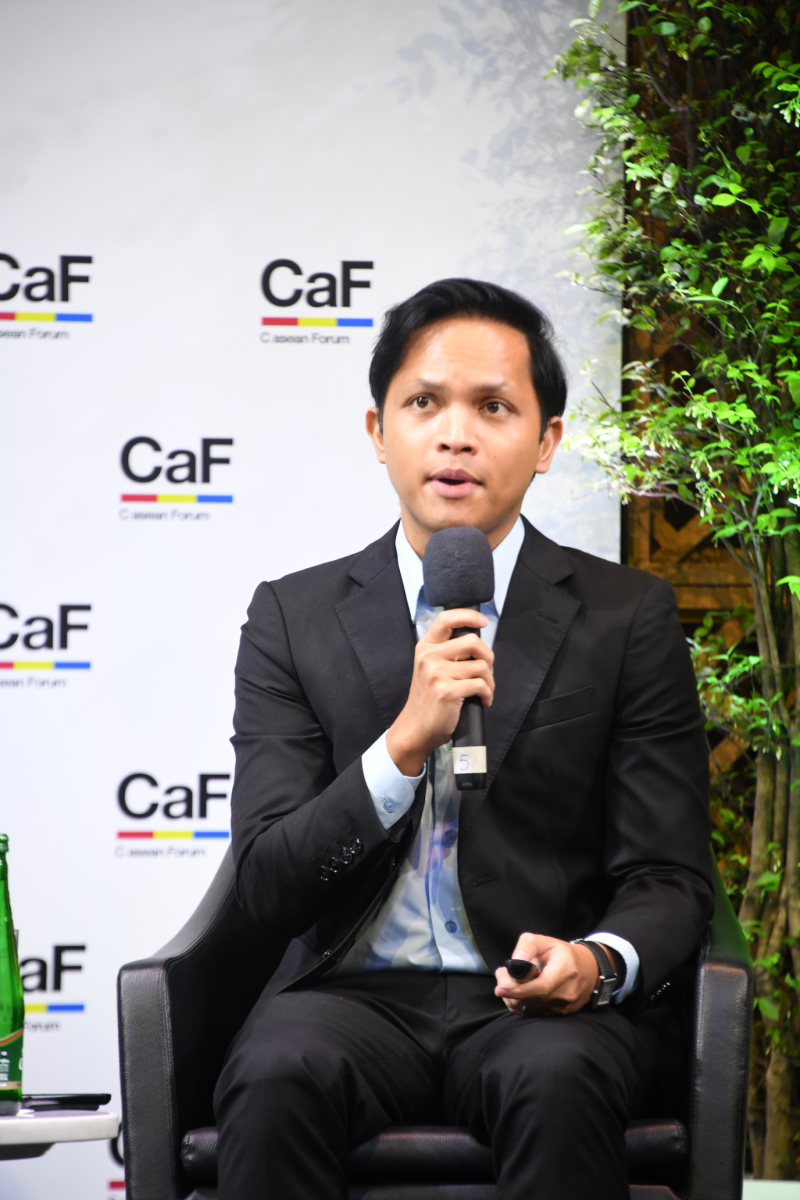 Carlo Chen-Delantar, a prominent figure in social entrepreneurship and circular economy initiatives, initiated the discussion by probing the EPR hotspots in the Philippines and seeking insights on lessons that the country could glean from other ASEAN counterparts. With his extensive background in responsible investments and tech ecosystem development, Carlo Chen-Delantar’s inquiry set the stage for a comprehensive exploration of the Philippines’ role in advancing EPR practices within ASEAN. Carlo continued the discussion by examining the evolution of public-private partnerships in facilitating financing for EPR and circular economy projects, particularly in the Philippines and other regional contexts. His inquiry delved into the implications of transitioning the Solid Waste Management Act into EPR law in the Philippines, shedding light on the evolving landscape of sustainable waste management practices.
Carlo Chen-Delantar, a prominent figure in social entrepreneurship and circular economy initiatives, initiated the discussion by probing the EPR hotspots in the Philippines and seeking insights on lessons that the country could glean from other ASEAN counterparts. With his extensive background in responsible investments and tech ecosystem development, Carlo Chen-Delantar’s inquiry set the stage for a comprehensive exploration of the Philippines’ role in advancing EPR practices within ASEAN. Carlo continued the discussion by examining the evolution of public-private partnerships in facilitating financing for EPR and circular economy projects, particularly in the Philippines and other regional contexts. His inquiry delved into the implications of transitioning the Solid Waste Management Act into EPR law in the Philippines, shedding light on the evolving landscape of sustainable waste management practices.
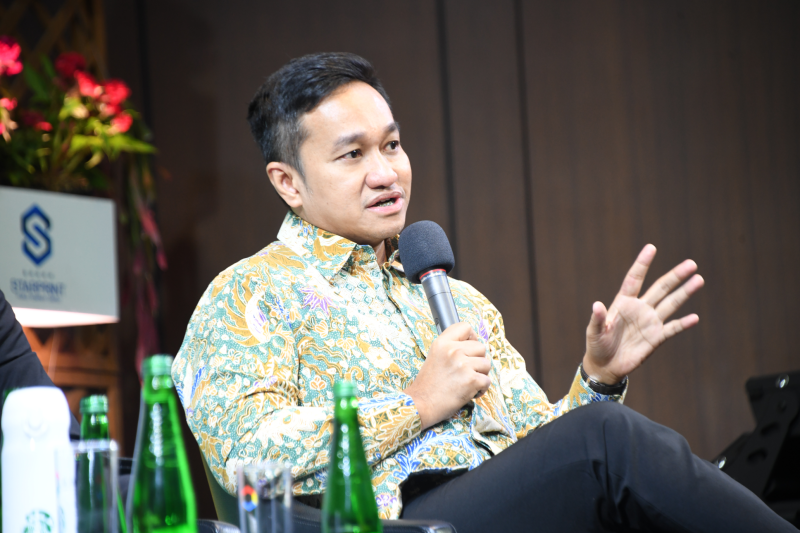 Rocky Pairunan from the World Resources Institute delved into Indonesia’s socio-economic and environmental context, addressing the challenges and opportunities in implementing EPR for plastic waste management. His inquiry underscored the necessity of tailored strategies and incentive mechanisms to encourage businesses to embrace EPR practices and invest in sustainable production and waste management systems, highlighting the critical role of regulatory frameworks in driving change. Rocky further elaborated on the Indonesian government’s collaborative efforts with stakeholders, including industry players, civil society organisations, and international partners such as the European Union, to develop and implement effective EPR policies and regulations for plastic waste management. His contribution highlighted the significance of multi-stakeholder engagement in driving sustainable solutions to combat plastic pollution in Indonesia and beyond.
Rocky Pairunan from the World Resources Institute delved into Indonesia’s socio-economic and environmental context, addressing the challenges and opportunities in implementing EPR for plastic waste management. His inquiry underscored the necessity of tailored strategies and incentive mechanisms to encourage businesses to embrace EPR practices and invest in sustainable production and waste management systems, highlighting the critical role of regulatory frameworks in driving change. Rocky further elaborated on the Indonesian government’s collaborative efforts with stakeholders, including industry players, civil society organisations, and international partners such as the European Union, to develop and implement effective EPR policies and regulations for plastic waste management. His contribution highlighted the significance of multi-stakeholder engagement in driving sustainable solutions to combat plastic pollution in Indonesia and beyond.
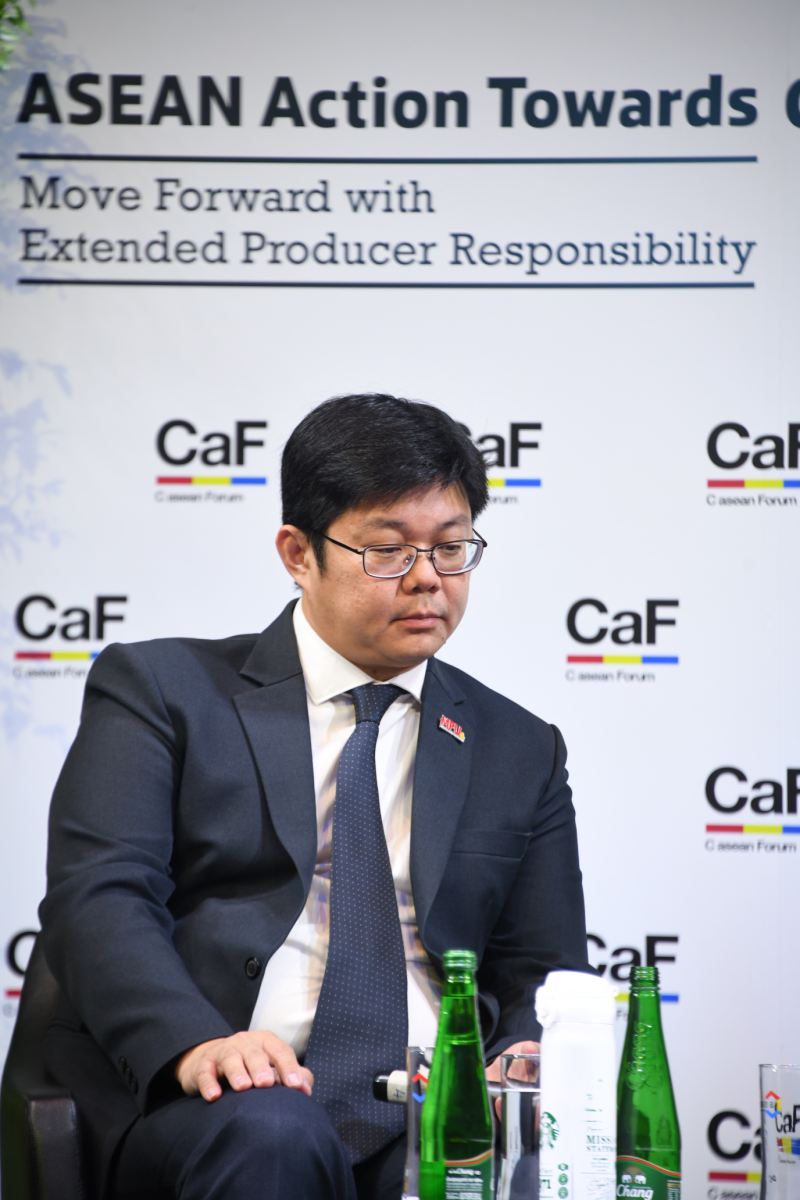 Dr. Panate Manomaivibool, an esteemed environmental policy expert, led discussions on fostering collaboration among ASEAN member states to harmonise EPR regulations and standards. His expertise in solid waste management and policy evaluation provided valuable insights into ensuring consistency and coherence in EPR implementation across the region, emphasising the need for collaborative efforts to address shared environmental challenges effectively during the discussion, Professor Panate expanded the discourse by exploring the potential of EPR+ in addressing the pressing issue of marine debris in ASEAN. His insights offered a holistic perspective on how integrating additional measures into EPR frameworks could mitigate marine pollution, underscoring the importance of comprehensive solutions to safeguard marine ecosystems.
Dr. Panate Manomaivibool, an esteemed environmental policy expert, led discussions on fostering collaboration among ASEAN member states to harmonise EPR regulations and standards. His expertise in solid waste management and policy evaluation provided valuable insights into ensuring consistency and coherence in EPR implementation across the region, emphasising the need for collaborative efforts to address shared environmental challenges effectively during the discussion, Professor Panate expanded the discourse by exploring the potential of EPR+ in addressing the pressing issue of marine debris in ASEAN. His insights offered a holistic perspective on how integrating additional measures into EPR frameworks could mitigate marine pollution, underscoring the importance of comprehensive solutions to safeguard marine ecosystems.
The panel discussion concluded with a consensus on the imperative of collective action and collaborative partnerships to accelerate the adoption of EPR and advance circular economy principles across ASEAN, laying the groundwork for a more sustainable future in the region.
Key Takeaways from the panel discussion are:
- Focus on Local Contexts: Experts emphasised the importance of understanding each ASEAN member state’s unique socio-economic and environmental context when implementing EPR. This approach ensures tailored strategies and incentive mechanisms to encourage businesses to embrace EPR practices effectively.
- Need for Regulatory Frameworks: Regulatory frameworks are crucial in driving change towards sustainable waste management practices. Harmonising EPR regulations across ASEAN member states can ensure consistency and coherence in implementation, facilitating collaboration and addressing shared environmental challenges effectively.
- Integration of Additional Measures: Discussions highlighted the potential of integrating additional measures, such as EPR+, into existing frameworks to address pressing environmental issues like marine debris. This holistic approach emphasises the importance of comprehensive solutions to safeguard marine ecosystems.
- Importance of Collaboration: The panel concluded with a consensus on the imperative of collective action and collaborative partnerships. Multi-stakeholder engagement, including government bodies, industry players, civil society organisations, and international partners, is crucial in driving sustainable solutions and combating plastic pollution effectively across ASEAN.
DOWNLOAD PRESENTATION MATERIALS HERE!
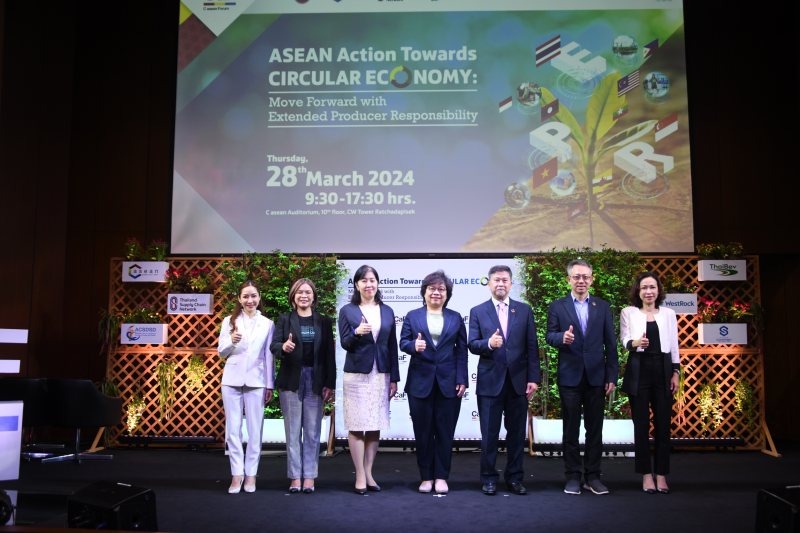 The afternoon session of the C asean Forum on “ASEAN Action Towards Circular Economy: Move Forward with Extended Producer Responsibility” commenced with a series of insightful presentations and discussions aimed at driving sustainable development initiatives in Thailand.
The afternoon session of the C asean Forum on “ASEAN Action Towards Circular Economy: Move Forward with Extended Producer Responsibility” commenced with a series of insightful presentations and discussions aimed at driving sustainable development initiatives in Thailand.
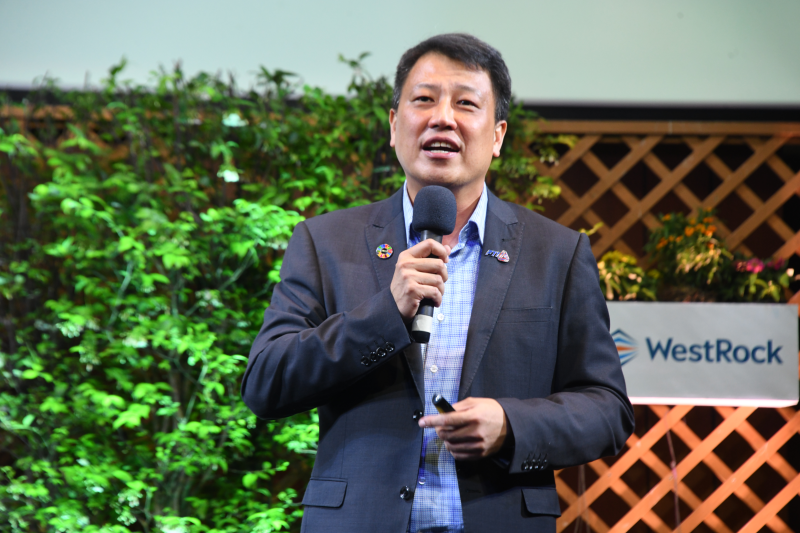 1. Presentation on “Thailand National EPR” Mr. Patinya Silsupadol, Deputy Secretary General and Executive Board of TIPMSE, The Federation of Thai Industries, began the session with a presentation on “Thailand National EPR.” Mr. Patinya illuminated Thailand’s endeavors in implementing Extended Producer Responsibility (EPR) principles, emphasizing their significance in shaping the nation’s industrial landscape.
1. Presentation on “Thailand National EPR” Mr. Patinya Silsupadol, Deputy Secretary General and Executive Board of TIPMSE, The Federation of Thai Industries, began the session with a presentation on “Thailand National EPR.” Mr. Patinya illuminated Thailand’s endeavors in implementing Extended Producer Responsibility (EPR) principles, emphasizing their significance in shaping the nation’s industrial landscape.
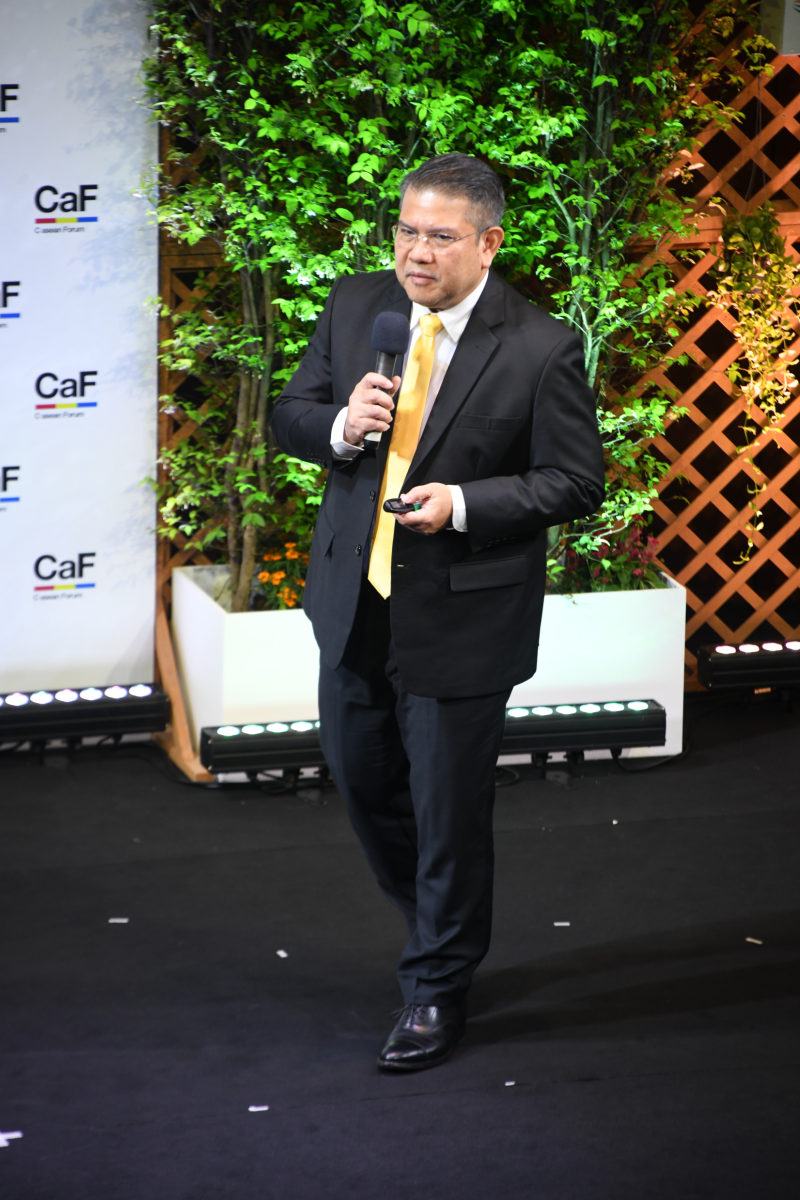 2. Presentation on “Financial Mechanism for Thailand’s Circular Economy: Regulatory Perspective” Following Mr. Patinya’s presentation, Mr. Pavich Kasavawong, Deputy Director General of the Department of Climate Change and Environment (DCCE), elaborated on the “Financial Mechanism for Thailand’s Circular Economy: Regulatory Perspective.” Mr. Pavich provided valuable insights into the regulatory framework essential for fostering a circular economy in Thailand.
2. Presentation on “Financial Mechanism for Thailand’s Circular Economy: Regulatory Perspective” Following Mr. Patinya’s presentation, Mr. Pavich Kasavawong, Deputy Director General of the Department of Climate Change and Environment (DCCE), elaborated on the “Financial Mechanism for Thailand’s Circular Economy: Regulatory Perspective.” Mr. Pavich provided valuable insights into the regulatory framework essential for fostering a circular economy in Thailand.
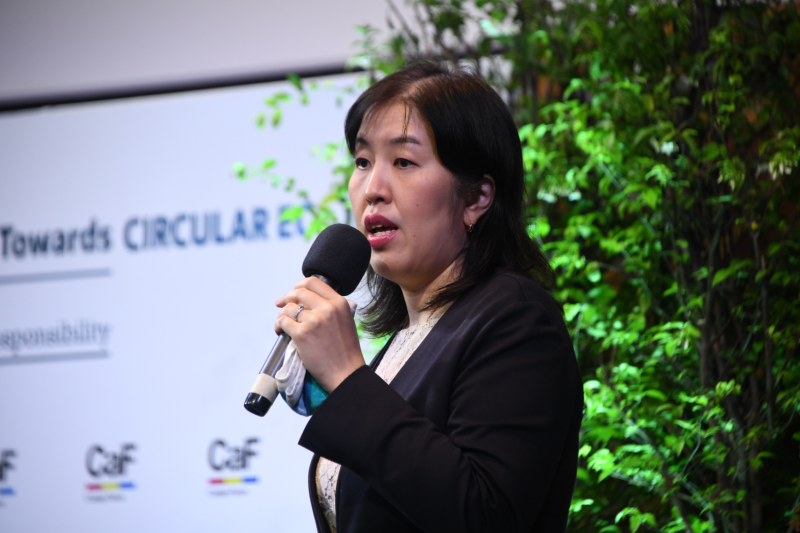
3. Presentation on “Financial Mechanism for Thailand’s Circular Economy: Funding Perspective” Ms. Rieko Kubota, Senior Environmental Engineer from The World Bank, continued the discourse with her presentation on the “Financial Mechanism for Thailand’s Circular Economy: Funding Perspective.” Ms. Kubota explored critical funding mechanisms necessary for driving sustainable development initiatives in Thailand, shedding light on avenues for financial support.
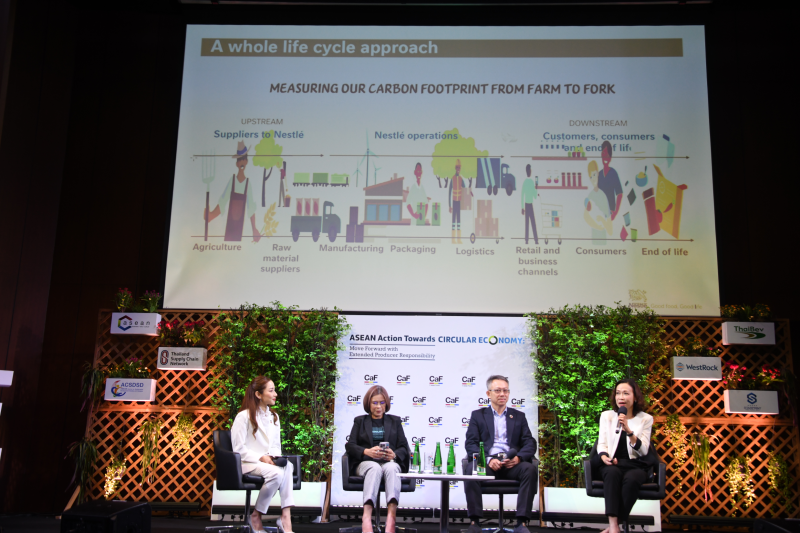 4. Practitioner Panel Discussion: Advancing Sustainable Recycling Concluding the session was a practitioner panel discussion moderated by Ms. Vijitar Supakong, Vice President – Sustainability and Risk Management at Berli Jucker. The panel, titled “Advancing Sustainable Recycling,” featured esteemed practitioners including Mr. Soonthorn Yongvibulsiri from SCG Packaging, Ms. Salinla Seehaphan from Nestle, and Ms. Kitiya Santaveesuk from Thai Beverage Can. They shared their experiences and insights on advancing sustainable recycling practices, providing valuable perspectives for fostering a circular economy in Thailand.
4. Practitioner Panel Discussion: Advancing Sustainable Recycling Concluding the session was a practitioner panel discussion moderated by Ms. Vijitar Supakong, Vice President – Sustainability and Risk Management at Berli Jucker. The panel, titled “Advancing Sustainable Recycling,” featured esteemed practitioners including Mr. Soonthorn Yongvibulsiri from SCG Packaging, Ms. Salinla Seehaphan from Nestle, and Ms. Kitiya Santaveesuk from Thai Beverage Can. They shared their experiences and insights on advancing sustainable recycling practices, providing valuable perspectives for fostering a circular economy in Thailand.
The afternoon session of the C asean Forum proved to be a platform for engaging discussions and presentations, offering valuable insights and strategies for advancing sustainable development initiatives and promoting circular economy principles in Thailand.
Exhibition Session at C asean Forum: ASEAN Action Towards Circular Economy
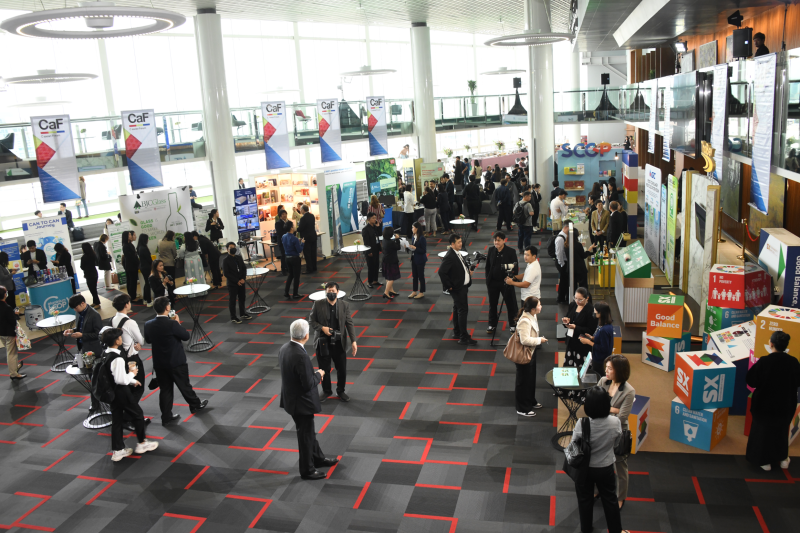 The exhibition session at the C asean Forum: ASEAN Action Towards Circular Economy provided a comprehensive showcase of organizations dedicated to promoting sustainability and circular economy principles within the ASEAN region. It offers attendees valuable insights into the latest innovations and initiatives driving the ASEAN region’s transition towards a circular economy. With booths from diverse organisations, the event facilitated knowledge sharing, collaboration, and collective action towards a more sustainable future.
The exhibition session at the C asean Forum: ASEAN Action Towards Circular Economy provided a comprehensive showcase of organizations dedicated to promoting sustainability and circular economy principles within the ASEAN region. It offers attendees valuable insights into the latest innovations and initiatives driving the ASEAN region’s transition towards a circular economy. With booths from diverse organisations, the event facilitated knowledge sharing, collaboration, and collective action towards a more sustainable future.
With booths from various stakeholders, attendees had the opportunity to explore innovative solutions and initiatives aimed at advancing extended producer responsibility (EPR) and sustainable waste management practices, including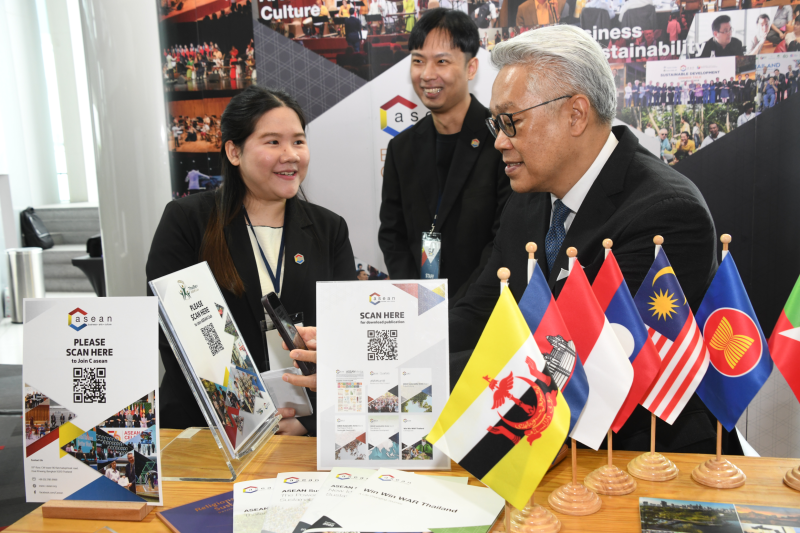
- C asean: C asean’s booth was the exhibition’s focal point, highlighting the organisation’s commitment to fostering collaboration and driving sustainable development across ASEAN. Representatives engaged with visitors, sharing insights into C asean’s initiatives and programs promoting circular economy practices within the region.
- ASEAN Centre for Sustainable Development Studies and Dialogue (ACSDSD) and ASEAN Circular Economy Stakeholder Platform (ACESP): The joint booth presented by ACSDSD and ACESP showcased research findings, projects, and partnerships focused on advancing sustainable development and circular economy principles within ASEAN. Attendees had the opportunity to learn about ongoing initiatives and engage with representatives to explore potential collaborations.
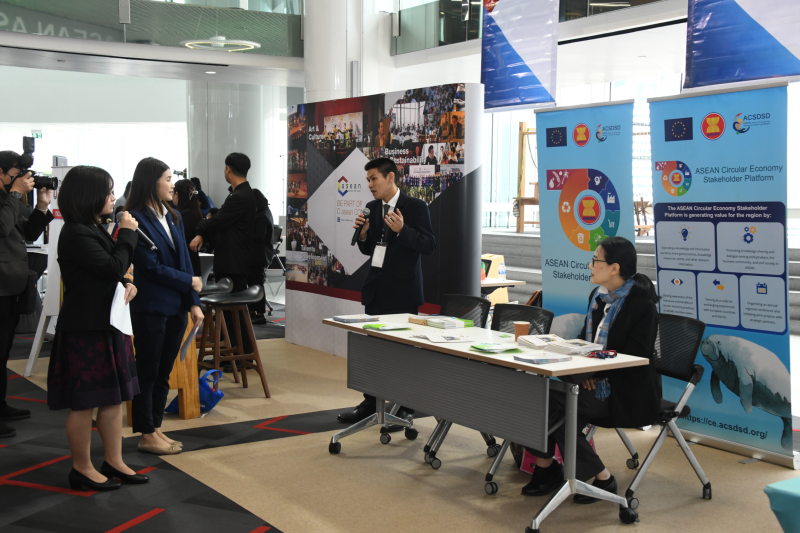
- Thailand Supply Chain Network (TSCN): TSCN’s booth highlighted the importance of supply chain sustainability in driving circular economy practices. Representatives showcased best practices and case studies, emphasising the role of supply chain management in promoting resource efficiency and reducing waste across various industries.
- ThaiBev: ThaiBev showcased its commitment to sustainability through innovative beverage production and packaging practices. Visitors learned about the company’s efforts to reduce environmental impact and promote circularity through recycling programs and eco-friendly packaging solutions.
- Sustainability Expo: The Sustainability Expo booth featured a diverse range of eco-friendly products and services from various vendors. Attendees explored sustainable alternatives for everyday consumption, from reusable packaging to energy-efficient technologies, promoting a culture of sustainability.
- TIPMSE: TIPMSE highlighted the latest advancements in EPR in Thailand. Representatives engaged with visitors, discussing the role of sustainable packaging in reducing waste and promoting circular economy practices.
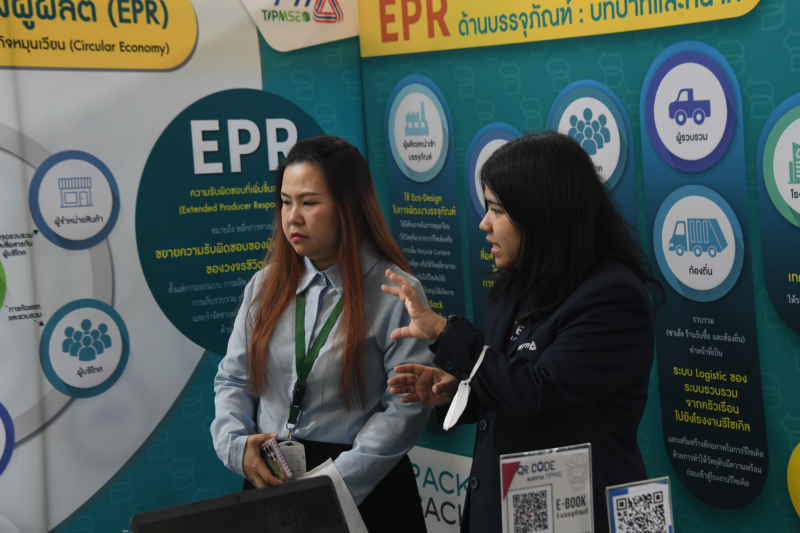
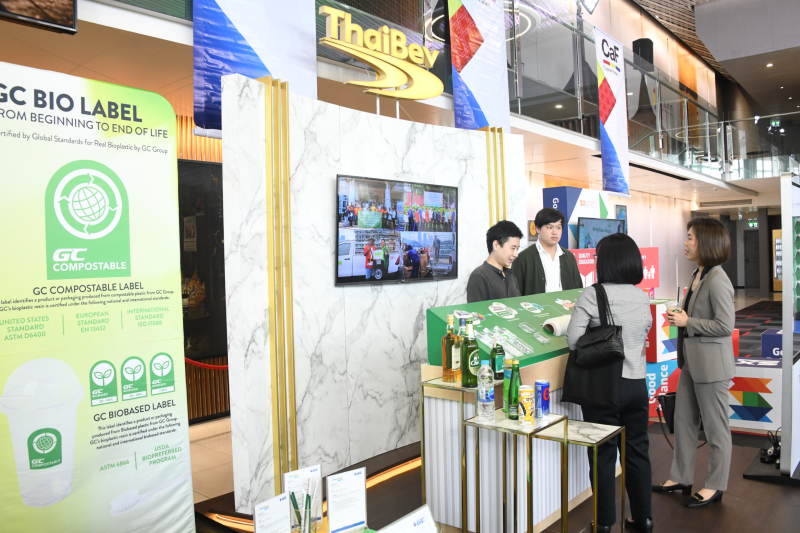 Thai Bev Can: Thai Bev Can showcases its efforts to promote recycling and waste reduction through innovative can designs and recycling initiatives. Attendees learned about the company’s commitment to increasing recycling rates and minimising environmental impact through responsible packaging practices.
Thai Bev Can: Thai Bev Can showcases its efforts to promote recycling and waste reduction through innovative can designs and recycling initiatives. Attendees learned about the company’s commitment to increasing recycling rates and minimising environmental impact through responsible packaging practices.
- BJC (Berli Jucker Public Company Limited): BJC’s booth featured its sustainable business practices and initiatives to reduce environmental footprint across its operations. Representatives discussed the company’s efforts to implement EPR strategies and promote circularity in product design and packaging.
- Ecolab: Ecolab presented its sustainable solutions for water, hygiene, and energy management, highlighting the importance of resource efficiency in driving circular economy practices. Visitors learned about Ecolab’s innovative technologies and services to minimise environmental impact and promote sustainable development.
- Westrock: Westrock showcased its sustainable packaging solutions, demonstrating how design innovations can contribute to waste reduction and product recyclability. Representatives engaged with attendees, discussing the company’s commitment to promoting circular economy principles in packaging design.
- Henkel: Henkel highlighted its eco-friendly products and initiatives to promote sustainable consumption and production practices. Visitors learned about Henkel’s efforts to incorporate recycled materials into its products and reduce carbon emissions throughout its value chain.
- SCG Paper (Siam Cement Group): SCG Paper’s booth featured its sustainable paper products and initiatives aimed at minimising environmental impact. Representatives discussed the company’s commitment to responsible sourcing and production practices, promoting circularity in the paper industry.
- PTT GC: PTT GC showcased its role in promoting corporate sustainability and responsible business practices within Thailand. Representatives engaged with visitors, discussing the importance of integrating sustainability into business strategies to drive positive environmental and social impact.
- IVL (Indorama Ventures Public Company Limited): IVL highlighted its efforts to promote sustainable materials and circular economy practices in the plastics industry. Attendees learned about IVL’s initiatives to increase recycled content in its products and reduce plastic waste through innovative recycling technologies.
